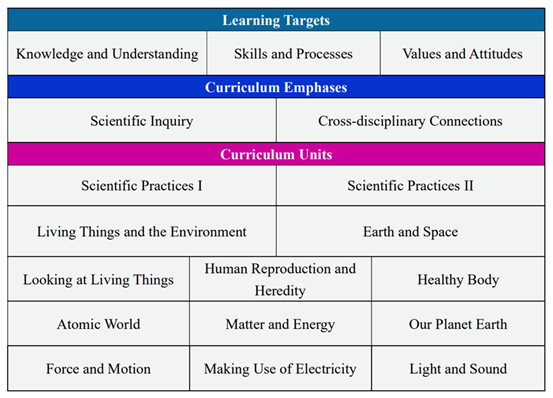The Science (S1–3) curriculum aims to provide students with diverse and engaging learning experiences in science, building upon their science learning at the primary level to sustain their curiosity and interest in the subject. The curriculum focuses on helping students establish a solid foundation of scientific knowledge while strengthening their scientific inquiry skills, preparing them to pursue further studies in senior secondary science and innovation-related subjects, and nurturing them to become lifelong learners in science.
Moreover, the curriculum encourages students to participate in scientific inquiry and cross-disciplinary learning activities, developing their scientific literacy and ability to integrate and apply knowledge and skills from different domains for creative problem-solving. It also aims to cultivate students’ ability to think critically and rationally about issues related to individual, societal, and global contexts, fostering proper values and scientific attitudes, as well as encouraging responsible actions to promote sustainable development and contribute meaningfully to our country and the world.
The broad aims of the Science (S1–3) Curriculum are to enable students to:
- Sustain and develop curiosity and interest in science and appreciate the wonder of nature;
- Develop a basic understanding of the nature of science and recognise the usefulness and limitations of science and the evolutionary nature of scientific knowledge;
- Acquire scientific knowledge and scientific inquiry skills to engage in scientific reasoning and scientific inquiry;
- Use scientific models and the language of science to communicate science-related ideas;
- Develop the ability to integrate and apply knowledge and skills of science and other related disciplines to foster creative problem-solving and innovation;
- Recognise the connections between science, innovation and technology (I&T), the environment, society, and engineering, and think critically about science-related issues;
- Be aware of the impact of human activities on the environment and act responsibly for its sustainable development; and
- Become lifelong learners in science for personal development and be prepared for further studies or professional development in science, technology, and engineering-related fields.
Curriculum Structure and Organisation
To put the curriculum aims and rationale into practice, the Science (S1-3) Curriculum is designed to facilitate students acquire “Knowledge and Understanding”, “Skills and Processes”, as well as “Values and Attitudes” through learning targets set out in the curriculum. This curriculum highlights “Scientific Inquiry” and “Cross-disciplinary Connections” as two curriculum emphases, aiming to nurture students’ scientific literacy and their ability to integrate and apply cross-disciplinary knowledge and skills creatively. The curriculum comprises thirteen curriculum units, covering different science domains including biology, chemistry, physics and earth science, along with learning elements of scientific inquiry.




